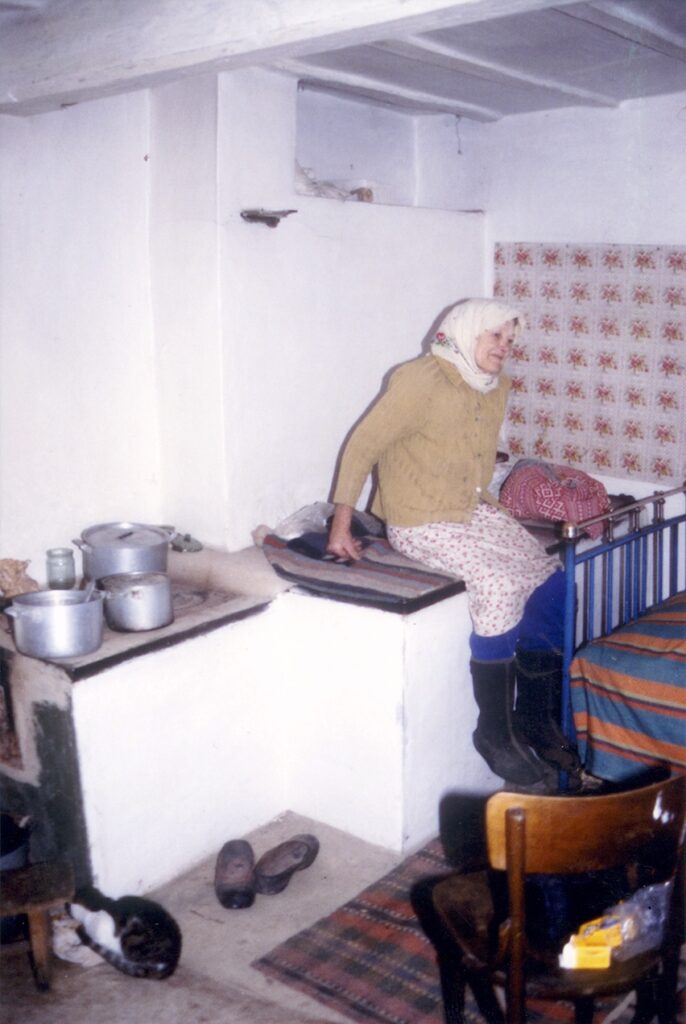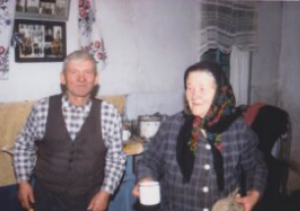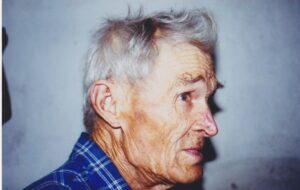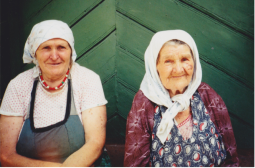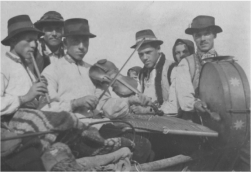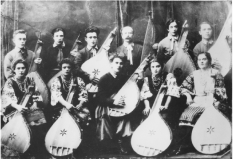Potapenko Motria Tymofiivna, b. 1920
Motria Tymofiivna Potapenko (Cherkasy region)
—Who was the head of the family?
Motria Tymofiivna: My father.
—What kind of work did your father do and what did your mother do?
Motria Tymofiivna: My father would plow, sow, look after the cattle, and my mother only milked the cows. They would plant potatoes together; my mother would also weed the crops and cook at home.
—How did the children help around the farmstead?
Motria Tymofiivna: We grazed cattle. My brother grazed the cattle, and I grazed the sheep; we had six of them. I was very little, and they would wake me up in the morning so I could graze the sheep. I used to fall asleep at the shore while grazing, and the passers-by would pat me with a stick to wake me up.
Motria Tymofiivna Potapenko (Cherkasy region)
—Did your parents have land and cattle?
Motria Tymofiivna: They owned cattle; cows, horses, pigs, and chickens—as it was supposed to be. They had three hectares of land. When everyone joined the kolhosp, my father said, “I will follow the people.” My mother didn’t want to join the kolhosp. Then my father and other men were locked in a house for the night. As soon as the person signed the papers to join the kolhosp, he was dismissed. If someone didn’t sign, he was allowed to go to work during the day but was locked up again for the night.
Motria Tymofiivna Potapenko (Cherkasy region)
—How much did you get in the kolhosp?
Motria Tymofiivna: I don’t remember how much they were giving us at first, but later on it was one hundred grams of bread.
—Per day?
Motria Tymofiivna: No. After a while, they would calculate a kopek per shift worked and deduct the loans (oblihatsiia). We didn’t get any money; they would deduct the loan from your earnings, similar to the present-day lotteries. They would also impose a tax of 150 Easter eggs, and there was a tax for childless people. I didn’t have children, so I paid that tax. They used to force loans unto people because no one wanted to take a loan. They would harass you until you signed the loan papers. Then they would deduct the money from your earnings.
……………………………………………………………………………………….
—Did you support the kolhosp?
Motria Tymofiivna: We didn’t worry about it at the time. We just lived, that’s it.
—Did you continue thinking about the field you owned?
Motria Tymofiivna: Yes, they took such good land from us, and we worked for free for them. They took a lot of sugar beets and potatoes from us.
……………………………………………………………………………………….
—Where did the people get the money for food and clothes?
Motria Tymofiivna: The clothes would be mended, and the food was whatever we produced on our own. We had a market and would sell fermented milk there. Others sold the boots they made at home.
—Did you make shirts for yourself during collectivization?
Motria Tymofiivna: Yes, I used to weave cloth and make skirts and shorts from the cloth. We’d make men’s pants and shawls. We used to wear what we made.
—Did you sell any of the clothes you made on the market?
Motria Tymofiivna: Yes.
—Did you exchange the clothes for food?
Motria Tymofiivna: I don’t remember because I was little at the time.
……………………………………………………………………………………….
—How much land did you have left after collectivization?
Motria Tymofiivna: I don’t remember how much land they left us, but they left some. They would take the land that was most suitable for the kolhosp; if the land didn’t fit, people continued using it privately. Then the process was mechanized, and land was taken away.
Motria Tymofiivna Potapenko (Cherkasy region)
—At what age did you start working in the kolhosp?
Motria Tymofiivna: I was sixteen. I finished the seventh grade and went to learn to work on a tractor trailer [prytsep].
—What is a tractor trailer?
Motria Tymofiivna: I would hook up the plows or bring the water. Now they can turn it off, but back in the day when the tractor stopped, I would clean with it a washcloth.
—What year was this?
Motria Tymofiivna: Probably 1936. I worked as a milk registrar near the school.
Motria Tymofiivna Potapenko
— What was the priest’s role in the village?
Motria Tymofiivna: The priest’s role was major. He had a lot of land, and the best land was his. Most people’s land was hilly, with sand and clay, but the priest’s land was in the valley that stretched out toward the woods. This land is still called “the priest’s land” and land of lower quality is called “the peasants’ land.” On Sundays, people would pray, and once they were finished, they would go to work.
— How were they paid for their work?
Motria Tymofiivna: The priest didn’t pay them anything. It was their duty because he was the priest. If you didn’t bring him a chicken when you went to him to name your child, he’d pick an odd name for a newborn like Okakii. We had one Okakii in the village because his father didn’t give the priest a chicken.
— Was the priest the only one with the authority to name newborns?
Motria Tymofiivna: He was the one.
— If someone didn’t want to work for the priest, what was the consequence?
Motria Tymofiivna: No consequences. The priest had women naimyty as well as a stableman, and an oxman. He owned horses and a large farm. We had two churches. One was Horianska, near to Horiansk [likely a local kutok].
Potapenko Motria Tymofiïvna
— Was there another church?
Motria Tymofiïvna: The other one was destroyed before the war. The bells were made of gold, so they were demolished.
— Who demolished the bells?
Motria Tymofiïvna: One man from the village. One day he was cutting metal at work and was hit by a metal rod. People say that his was punishment [for his treatment] of the bells.
Motria Tymofiivna Potapenko (Cherkasy region)
—What was the priest’s role during the kolhosp time? Or did you prefer the church?
Motria Tymofiivna: At first, we had a priest, and then he was sent into exile, the same way as the kurkuli were.
—Was the church empty at the time?
Motria Tymofiivna: The church was empty, and there was no service. Everything was looted and thrown away; nothing was left. The building was used as a wheat barn.
—Was there another church?
Motria Tymofiivna: That one was destroyed before the war. The golden church bells were dismantled.
—Who dismantled the bells?
Motria Tymofiivna: One man from the village. He was struck by a metal construction when he was cutting something at the base. People say this was a punishment for the bells. The head of the kolhosp oversaw the demolition.
……………………………………
—What do you remember of the khresnyi khid? Was there a procession with a priest to summon the rain?
Motria Tymofiivna: Yes, I remember we used to walk praying for the rain to come. The priest had a thermometer that identified where the rain was likely to start. He’d say, “People, let’s go toward the steppe.” People would follow in the direction of the steppe where the rain was, so the priest was right because he had a barometer; he didn’t want to go there but since the barometer showed the direction, he followed. The people returned all soaking wet; the priest knows what he says.
Motria Tymofiivna Potapenko (Cherkasy region)
—After the church was closed and the village didn’t have a priest anymore, did the people sing at the funerals?
Motria Tymofiivna: I don’t know.
—Do the old people sing psalms at the funerals now?
Motria Tymofiivna: Yes, they do. Now we have a priest. If they can’t bring a priest, there are four women in the village who come to sing either with the priest or without.
—Do you know these women?
Motria Tymofiivna: They live in the center of the village: Lida Shuliakova, Galia Revachka, and Parasia Kotsurenko. One household wanted to hire all four of them, and they charged ten thousand karbovantsi each. People scolded them a great deal for this, so they didn’t take the money.
—How many years have they been singing?
Motria Tymofiïvna: Perhaps two years. They’ve had some practice by now.
Motria Tymofiivna Potapenko (Cherkasy region)
—Did you go singing koliadky when you were sixteen?
Motria Tymofiivna: People used to go singing koliadky and shchedrivky, but I didn’t.
—After the kolhospy were introduced, did children go singing koliadky?
Motria Tymofiivna: Yes, they did, and they brought holiday dinner to their godparents, too. I brought dinner, too, because we lived in poverty. When I was in school, we were strongly criticized for doing so. I was marked on public boards as a figure carrying a bundle.
—Were you worried then?
Motria Tymofiivna: No, I wasn’t. I didn’t know at the time that you had to be worried. I would eat a candy and get a few coins.
—Were you told at school to stop caroling?
Motria Tymofiivna: The teacher told all the children to stop going, but I kept going to my godmother and my godfather.
Motria Tymofiivna Potapenko (Cherkasy region)
—Were there painters-bohomazy who made icons in your village?
Motria Tymofiivna: Not in our village. The icons would come from elsewhere.
—Did people with the icons come when the church was being built?
Motria Tymofiivna: They’ve come recently to paint the saints on the walls. Back in the day, there were only icons in the church. If someone died, the family would donate an icon to the church. Both churches in the village were full of icons.
—If your mother wanted to have icons in the house, where would she buy them?
Motria Tymofiivna: Icons were sold at the bazaar.
—Do you remember how much they cost?
Motria Tymofiivna: I would buy the ones I liked.
—What word did you use for icons?
Motria Tymofiivna: Some people call them “obrazy” and others “ikony.”
—Did you use the word “bohy”?
Motria Tymofiivna: Yes. People used different words for icons.
—Which icons were most frequently used in houses?
Motria Tymofiivna: Christ the Savior was mandatory.
—What was the name of the place where icons were hung at home?
Motria Tymofiivna: You must have the Mother of God in the pokut (the corner in which icons were hung in the house).
—Is the icon of St. Nicholas mandatory?
Motria Tymofiivna: We didn’t have one; maybe other people did.
—Why did people sometimes use an altar lamp?
Motria Tymofiivna: Perhaps for decoration or when someone died. I have one here for the deceased. It was customary to light one when someone died, and if you didn’t have a lamp, you would borrow one.
—Did people put an icon near the head of the deceased?
Motria Tymofiivna: Yes, and they still do.
—Why is it done?
Motria Tymofiivna: Who knows? When I die, they won’t put an icon into my coffin because I don’t know how to pray. I just live, so I guess no one will put an icon into my coffin. I have read all the books from the library and remember them all. There isn’t a single book in the library that I haven’t read, but when it comes to a song or something churchy, I can’t remember a thing.
—Was there an icon in the church that one prayed to before leaving the village?
Motria Tymofiivna: Yes, there’s one icon like that.
Motria Tymofiivna Potapenko (Cherkasy region)
—Do you remember what music was played at weddings?
Motria Tymofiivna: Polka, hopak, and krakowiak.
—What instruments did they play?
Motria Tymofiivna: Harmonia, fiddle and bubon. The harmonia and the bubon were the standard [instrumentation], and the fiddle would join in if there was a fiddle player in the village.
…………………………………………………………………………………
Motria Tymofiivna: There was no harmonia before the war, only fiddle and bubon. These guys played in people’s homes, not in the tavern. One played harmonia, and the other—bubon.
Motria Tymofiivna Potapenko (Cherkasy region)
—How many days did a wedding last when you were a young girl?
Motria Tymofiivna: Four days. When I was getting married, the wedding would last four days: Saturday–Tuesday. People drank and partied. They looked forward to drink for free, and the bride’s father would be glad to treat them to drinks because he gave his daughter in marriage.
—In the 1930s with the advent of the kolhospy, did the weddings become shorter?
Motria Tymofiivna: Depends on the family.
—When you were getting married, did you have traditional matchmaking? How was it?
Motria Tymofiivna: The matchmakers came and arranged everything, including the wedding date.
—Who were the matchmakers?
Motria Tymofiivna: The groom sent two people. Three of them came: an uncle, the groom, and his brother.
—What did your mother give you as dowry?
Motria Tymofiivna: My mother bought two pillows, four comforters, and six blankets in advance.
—Did you embroider your own shirts?
Motria Tymofiivna: I got married in an embroidered shirt that I made.
—Was it mandatory for a woman to take her husband’s name?
Motria Tymofiivna: Different people had different lives. One woman was visited by the matchmakers. She put a scarf on the groom and on herself and wore it for a week, but he left and gave back her scarf. He was from another village. He came with his uncles but later on understood that he didn’t need her. So, at the end of the week, she removed her scarf.
—Did she get married later on?
Motria Tymofiivna: Yes.
……………………………………………………………………………….
—Could husband and wife divorce before collectivization?
Motria Tymofiivna: Yes.
—Could they remarry after this?
Motria Tymofiivna: Yes.
—Who filed for divorce?
Motria Tymofiivna: A person could just leave, that’s it. A friend of my mother’s married a person she didn’t want to marry; she was forced to. The groom was in the house.
She went outside wearing the flower wreath and was taken away. He waited, but she didn’t come back. A month later, they found out that she was in Siberia in Norilsk. The man who loved her eloped with her. They lived there and used to come to our village to visit.
Motria Tymofiivna Potapenko (Cherkasy region)
—Did the startsi go door-to-door in your village?
Motria Tymofiivna: Yes. I don’t know if they were blind or pretended to be blind. Mostly, they were the blind or amputees.
—Did any children come with them?
Motria Tymofiivna: No children.
—Did they have any guides?
Motria Tymofiivna: A wife would be the guide to her blind husband. There was one man who lost both of his hands because he used to steal. His healthy wife used to accompany him. If a wife was blind but she had a healthy husband, he would go with her. Some people gave them a piece of bread, and others gave nothing.
—Where were they from?
Motria Tymofiivna: They were locals from Shutivka.
—Did they sing anything?
Motria Tymofiivna: The man who had no hands used to sing.
—What did he sing?
Motria Tymofiivna: I don’t know. The woman who sat near me used to say that he sang about the Altai Mountains.
—Do you remember any startsi who played lira near the church?
Motria Tymofiivna: I haven’t seen any in our village. There was one man dressed in rags. His name was Varfalomei. He didn’t play but he used to say that this church would be gone. He went around it and made the sign of the cross.
—Do you remember if any startsi played musical instruments during the market fairs?
Motria Tymofiivna: I didn’t go to market fairs.
—Did the startsi go door-to-door after the kolhospy were set up?
Motria Tymofiivna: Yes, they continued coming for a long time until they were dispersed.
—What about after the war?
Motria Tymofiivna: There were none after the war. They were all annihilated.
—Do you know how this was done?
Motria Tymofiivna: I don’t know how this was done, but they were gone. They were not arrested, just warned not to go around.
—Were there any bandura players in your village?
Motria Tymofiivna: Not in our village.
Motria Tymofiivna Potapenko (Cherkasy region)
—Who was the head of the family?
Motria Tymofiivna: My father.
—What kind of work did your father do and what did your mother do?
Motria Tymofiivna: My father would plow, sow, look after the cattle, and my mother only milked the cows. They would plant potatoes together; my mother would also weed the crops and cook at home.
—How did the children help around the farmstead?
Motria Tymofiivna: We grazed cattle. My brother grazed the cattle, and I grazed the sheep; we had six of them. I was very little, and they would wake me up in the morning so I could graze the sheep. I used to fall asleep at the shore while grazing, and the passers-by would pat me with a stick to wake me up.
